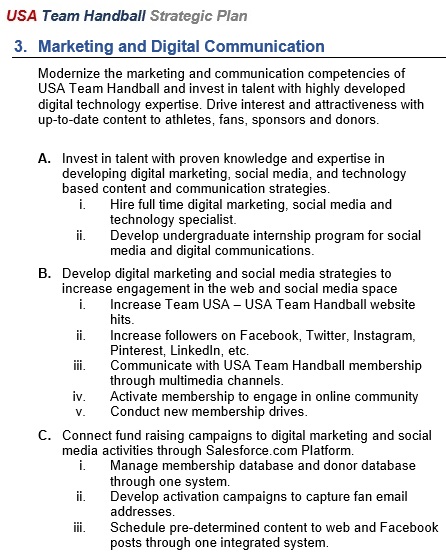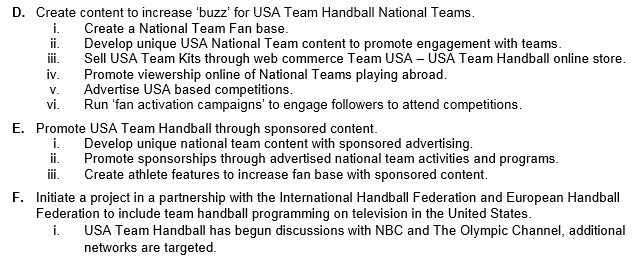
This is part of an ongoing series: Link
Marketing Handball in the U.S.: A Long Standing and Vexing Challenge
Virtually every newcomer to team handball in the U.S. has the same reaction, “This sport is awesome! How did I not even know this sport exists?” And, often the next conclusion is, “Wow. Whoever is responsible or behind this sport must be horrible marketers.” After all, what else could possibly explain why you’ve never heard or seen it before?
An understandable, if simplistic response, but if one does a little investigation it becomes clear that there are some underlying issues that make marketing handball in the U.S. is challenging. I first captured some of those issues in a series of commentaries I wrote to explain why the U.S. wasn’t at the 2012 Olympics. The marketing sections are below:
Part 5: A lack of awareness and marketing: One in a million? The 312 real fans of Team Handball in the U.S.: Link
Part 6: A lack of awareness and marketing: The Catch 22 TV paradox: Link
Part 7: A lack of awareness and marketing: The historic lack of European support: Link
Part 8: A lack of awareness and marketing: Europe sees the light, but can’t quite figure out how to properly invade the U.S. market: Link
While much of what I wrote 8 years ago still rings true there have been some positive developments:
- Handball has been on TV more often. EHF Champions League matches have been on beIN Sports since 2013. The IHF World Championships have also been aired regularly, first with beIN Sports and then with the NBC Olympic Channel starting in 2019.
- Social media has become more prevalent and has become another way to promote the sport.
- Most importantly, the IHF and EHF have seen the light and are starting to more aggressively pursue development of the U.S. market.
USA Team Handball Strategic Plan Marketing Goals
The USA Team Handball Strategic Plan identifies marketing as one of its major goals. Here are the documented goals, objectives and targets related to marketing.



For the most part, I’ve got no problems with the identified objectives. They are all things that need to be done in terms of marketing. Objective C, with it’s Salesforce specific solution is perhaps the exception.
To varying degrees USA Team Handball also appears to be addressing most of these objectives. The organization’s first full time Communications Manager, Melissa Zhang has done a great job with the website, cleaning up athlete profiles and with regular stories on current and former athletes. And, USA Team Handball is also now more active on its social media channels and rarely misses an opportunity to engage with anyone or any outlet discussing or discovering handball.
In terms of targets the 2020 Facebook goal hasn’t been met, but arguably as Facebook has turned into the domain of old timers it’s of less importance than youth focused Instagram and TikTok. I’ve no idea whether the web hits target has been met, but one would suspect that more frequent posting has resulted in greater web traffic.
Feeding the Fan Base vs Expanding the Fan Base
While running a handball website for 14 years I’ve come to grips with a marketing dichotomy which can best be described as “feeding the fan base” vs “expanding the fan base”. I’ll say with some authority that the handball fan base in the U.S. is very, very small. Depending on how generous one wants to be in terms of definition it’s somewhere between 300 and 2,000 people. And, that’s including non U.S. citizens. As someone who’s really passionate about handball and has a website devoted to the sport I’ll just say that reality is downright depressing sometimes.
Does the resigned saying, “It is, what it is” apply? Or, is that self defeatism? Can effective steps be taken to methodically expand that fan base? Perhaps, but I would suggest that it’s very difficult to organically grow a fan base for a narrowly defined topic like team handball. To essentially create new fans of the sport via well written articles and social media engagement. For sure, such efforts are greatly appreciated, but unfortunately only by the “already converted.” Don’t get me wrong: Feeding the fan base is important… just arguably of less importance when your base is so small.
Expanding the Base Hinges Almost Entirely On More and Better TV Exposure
So what can be done to really expand the base? Answer: Regular TV broadcasts of matches and, critically important, on networks with the greatest reach into American homes. I know this sounds, “old school”, but, it’s still the reality. Anecdotally, the percentage of Americans that have first discovered the sport via TV is off the charts. And, I suspect a structured survey would simply confirm that suspicion. Analytically, Google trend data directly correlates to TV broadcasts and I can assure you that internal website metrics do as well.
It’s really simple: Nothing reaches more Americans than TV and nothing reaches more young Americans than the social media engagement that directly or indirectly stems from the video content that major TV outlets can post online to their millions of followers.
I’ve said it a thousand times. If handball were to be broadcast on a regular basis on network like ESPN, virtually every statement discussing handball’s progress in the U.S. would from that point on start with these words:
“Well, after handball started being shown on ESPN…”
Pick how you want to finish the sentence. Here are some possibilities:
- Collegiate handball really took off with an expansion to several hundred clubs
- Youth programs expanded in several cities feeding the collegiate programs
- USA Team Handball had year on year membership growth of xx%; Along with accompanying increases in website visits and social media engagement
- Merchandise sales of professional handball clubs in Europe gradually increased as more Americans became fans of the game
- The quality of stateside play improved dramatically
- The level of stateside talent making our national teams starting improving
One Marketing Objective Above All Others
The point of this discussion is to emphasize that one marketing objective: getting handball on TV more often trumps all others… because it’s a true force multiplier that greatly improves the likelihood of better results in all other areas. In other words, anything and everything that can be done to make that happen should be a very high priority.
For sure it’s seen as important, but it’s not clear where it stacks in terms of priorities. I would make the case that empirically, it’s the #1 goal, and, if the Strategic Plan is updated I would argue that this priority should be clearly stated. Further, there are a number of supporting objectives that could be undertaken to facilitate achieving this goal to include attending TV rights conferences and the hiring of consultants to facilitate coordination between networks and handball content owners. It might even justify the use of limited funds and resources to produce USA based TV content. Or even… in some instances pay to have content aired.
One aspect that helps. Getting handball on TV in the U.S. isn’t just a USA Team Handball goal, but pretty much a goal of anyone who cares about the sport. In particular, content owners like the IHF and EHF would stand to benefit the most from making it happen. Further, developments like OTT web streaming are making it more feasible than it was in the past.
Is getting handball on TV a panacea? The silver bullet to all our problems? I, for one, am generally not prone to such profound, blanket statements, but… yeah it pretty much is. Without a doubt, it is the one thing that could overnight change everything.
That wraps up the review of what USA Team Handball’s future plans are. At least what has been officially documented. But, are there unofficial, undocumented plans as well? It seems that there may be and I will address what those plans are next.